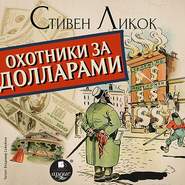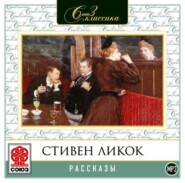По всем вопросам обращайтесь на: info@litportal.ru
(©) 2003-2025.
✖
The Hohenzollerns in America
Автор
Год написания книги
2019
Настройки чтения
Размер шрифта
Высота строк
Поля
"M. Touchusoff, the late financial secretary of the Soviet, was thrown into the Neva last evening. Roubles fell."
"M. Gorky, speaking in London last night, said that Russia was a great country. Roubles rose."
"A Dutch correspondent, who has just beat his way out of
Russia, reports that nothing will induce him to go back.
Roubles fell."
"Mr. Arthur Balfour, speaking in the House of Commons last night, paid a glowing tribute to the memory of Peter the Great. Roubles rose."
"The local Bolsheviki of New York City at the Pan-Russian Congress held in Murphy's Rooms, Fourth Avenue, voted unanimously in favor of a Free Russia. Roubles never budged."
With these examples in view, anybody, I think, could grasp the central principles of Russian finance. All that one needed to know was what M. Touchusoff and such people were going to say, and who would be thrown into the Neva, and the rise and fall of the rouble could be foreseen to a kopeck. In speculation by shrewd people with proper judgment as to when to buy and when to sell the rouble, large fortunes could be made, or even lost, in a day.
But after all the Russian finance was simple. That of our German enemies was much more complicated and yet infinitely more successful. That at least I gathered from the little news items in regard to German finance that used to reach us in cables that were headed Via Timbuctoo and ran thus:—
"The fourth Imperial War Loan of four billion marks, to be known as the Kaiser's War Loan, was oversubscribed to-day in five minutes. Investors thronged the banks, with tears in their eyes, bringing with them everything that they had. The bank managers, themselves stained with tears, took everything that was offered. Each investor received a button proudly displayed by the too-happy-for-words out-of-the-bank-hustling recipient."
6.—Some Just Complaints About the War
No patriotic man would have cared to lift up his voice against the Government in war time. Personally, I should not want to give utterance even now to anything in the way of criticism. But the complaints which were presented below came to me, unsought and unsolicited, and represented such a variety of sources and such just and unselfish points of view that I think it proper, for the sake of history, to offer them to the public.
I give them, just as they reached me, without modifications of any sort.
The just complaint of Mr. Threadler, my tailor, as expressed while measuring me for my Win-the-War autumn suit.
"Complaint, sir? Oh, no, we have no complaint to make in our line of business, none whatever (forty-two, Mr. Jephson). It would hardly become us to complain (side pockets, Mr. Jephson). But we think, perhaps, it is rather a mistake for the Government (thirty-three on the leg) to encourage the idea of economy in dress. Our attitude is that the well dressed man (a little fuller in the chest? Yes, a little fuller in the chest, please, Mr. Jephson) is better able to serve his country than the man who goes about in an old suit. The motto of our trade is Thrift with Taste. It was made up in our spring convention of five hundred members, in a four day sitting. We feel it to be (twenty-eight) very appropriate. Our feeling is that a gentleman wearing one of our thrift worsteds under one of our Win-the-War light overcoats (Mr. Jephson, please show that new Win-the-War overcoating) is really helping to keep things going. We like to reflect, sir (nothing in shirtings, today?) that we're doing our bit, too, in presenting to the enemy an undisturbed nation of well dressed men. Nothing else, sir? The week after next? Ah! If we can, sir! but we're greatly rushed with our new and patriotic Thrift orders. Good morning, sir."
The just complaint of Madame Pavalucini, the celebrated contralto. As interviewed incidentally in the palm-room of The Slitz Hotel, over a cup of tea (one dollar), French Win-the-War pastry (one fifty) and Help-the-Navy cigarettes (fifty).
"I would not want to creetecize ze gouvermen' ah! non! That would be what you call a skonk treeck, hein?" (Madame Pavalucini comes from Missouri, and dares not talk any other kind of English than this, while on tour, with any strangers listening.) "But, I ask myself, ees it not just a leetle wrong to discourage and tax ze poor artistes? We are doing our beet, hein? We seeng, we recite! I seeng so many beautiful sings to ze soldiers; sings about love, and youth, and passion, and spring and kisses. And the men are carried off their feet. They rise. They rush to the war. I have seen them, in my patriotic concerts where I accept nothing but my expenses and my fee and give all that is beyond to the war. Only last night one arose, right in the front rank—the fauteuils d'orchestre, I do not know how you call them in English. 'Let me out of zis,' he scream, 'me for the war! Me for the trenches!' Was it not magnifique—what you call splendide, hein?
"And then ze gouvermen' come and tell me I must pay zem ten thousan' dollars, when I make only seexty thousan' dollars at ze opera! Anozzer skonk treeck, hein?"
The just complaint of Mr. Grunch, income tax payer, as imparted to me over his own port wine, after dinner.
"No, I shouldn't want to complain: I mean, in any way that would reach the outside,—reach it, that is, in connection with my name. Though I think that the thing ought to be said by SOMEBODY. I think you might say it. (Let me pour you out another glass of this Conquistador: yes, it's the old '87: but I suppose we'll never get any more of it on this side: they say that the rich Spaniards are making so much money they're buying up every cask of it and it will never be exported again. Just another illustration of the way that the war hits everybody alike.) But, as I was saying, I think if YOU were to raise a complaint about the income tax, you'd find the whole country—I mean all the men with incomes—behind you. I don't suppose they'd want you to mention their names. But they'd be BEHIND you, see? They'd all be there. (Will you try one of these Googoolias? They're the very best, but I guess we'll never see them again. They say the rich Cubans are buying them up. So the war hits us there, too.) As I see it, the income tax is the greatest mistake the government ever made. It hits the wrong man. It falls on the man with an income and lets the other man escape. The way I look at it, and the way all the men that will be behind you look at it, is that if a man sticks tight to it and goes on earning all the income he can, he's doing his bit, in his own way, to win the war. All we ask is to be let alone (don't put that in your notes as from me, but you can say it), let us alone to go on quietly piling up income till we get the Germans licked. But if you start to take away our income, you discourage us, you knock all the patriotism out of us. To my mind, a man's income and his patriotism are the same thing. But, of course, don't say that I said that."
The just complaint of my barber, as expressed in the pauses of his operations.
"I'm not saying nothing against the Government (any facial massage this morning?). I guess they know their own business, or they'd ought to, anyway. But I kick at all this talk against the barber business in war time (will I singe them ends a bit?). The papers are full of it, all the time. I don't see much else in them. Last week I saw where a feller said that all the barber shops ought to be closed up (bay rum?) till the war was over. Say, I'd like to have him right here in this chair with a razor at his throat, the way I have you! As I see it, the barber business is the most necessary business in the whole war. A man'll get along without everything else, just about, but he can't get along without a shave, can he?—or not without losing all the pep and self-respect that keeps him going. They say them fellers over in France has to shave every morning by military order: if they didn't the Germans would have 'em beat. I say the barber is doing his bit as much as any man. I was to Washington four months last winter, and I done all the work of three senators and two congressmen (will I clip that neck?) and I done the work of a United States Admiral every Saturday night. If that ain't war work, show me what is. But I don't kick, I just go along. If a man appreciates what I do, and likes to pay a little extra for it, why so much the better, but if he's low enough to get out of this chair you're in and walk off without giving a cent more than he has to, why let him go. But, sometimes, when I get thinking about all this outcry about barber's work in war time, I feel like following the man to the door and slitting his throat for him… Thank you, sir; thank you, sir. Good morning. Next!"
The just complaint of Mr. Singlestone;—formerly Mr.
Einstein, Theatre Proprietor.
"I would be the last man, the very last, to say one word against the Government. I think they are doing fine. I think the boys in the trenches are doing fine. I think the nation is doing fine. But, if there's just one thing where they're wrong, it's in the matter of the theatres. I think it would be much better for the Government not to attempt to cut down or regulate theatres in any way. The theatre is the people's recreation. It builds them up. It's all part of a great machine to win the war. I like to stand in the box office and see the money come in and feel that the theatre is doing its bit. But, mind you, I think the President is doing fine. So, all I say is, I think the theatres ought to be allowed to do fine, too."
The just complaint of Mr. Silas Heck, farmer, as interviewed by me, incognito, at the counter of the Gold Dollar Saloon.
"Yes, sir, I say the Government's in the wrong, and I don't care who hears me. (Say, is that feller in the slick overcoat listening? Let's move along a little further.) They're right to carry on the war for all the nation is worth. That's sound and I'm with 'em. But they ought not to take the farmer offen his farm. There I'm agin them. The farmer is the one man necessary for the country. They say they want bacon for the Allies. Well, the way I look at it is, if you want bacon, you need hogs. And if there are no men left in the country like me, what'll you do for hogs!
"Thanks, was you paying for that? I guess we won't have another, eh? Two of them things might be bad for a feller."
So, when I used to listen to the complaints of this sort that rose on every side, I was glad that I was not President of the United States.
At the same time I DO think that the Government makes a mistake in taxing the profits of the poor book writers under the absurd name of INCOME. But let that go. The Kaiser would probably treat us worse.
I.—Some Startling Side Effects of the War
"There is no doubt," said Mr. Taft recently, "that the war is destined to effect the most profound uplift and changes, not only in our political outlook, but upon our culture, our thought and, most of all, upon our literature."
I am not absolutely certain that Mr. Taft really said this. He may not have said "uplift." But I seem to have heard something about uplift, somewhere. At any rate, there is no doubt of the fact that our literature has moved—up or down. Yes, the war is not only destined to affect our literature, but it has already done so. The change in outlook, in literary style, in mode of expression, even in the words themselves is already here.
Anybody can see it for himself by turning over the pages of our fashionable novels or by looking at the columns of our great American and English newspapers and periodicals.
But stop,—let me show what I mean by examples. I have them here in front of me. Take, for example, the London Spectator. Everybody recognised in it a model of literary dignity and decorum. Even those who read it least, admitted this most willingly; in fact, perhaps all the more so. In its pages to-day one finds an equal dignity of thought, yet, somehow, the wording seems to have undergone an alteration. One cannot say just where the change comes in. It is what the French call a je ne sais quoi, a something insaisissable, a sort of nuance, not amounting of course to a lueur, but still,—how shall one put it,—SOMETHING.
The example that is given below was taken almost word for word (indeed some of the words actually were so) from the very latest copy of The Spectator.
EDITORIAL FROM THE LONDON "SPECTATOR"
Showing the Stimulating Effect of the War on Its Literary Style
"There is no doubt that our boys, and the Americans, are going some on the western front. We have no hesitation in saying that last week's scrap was a cinch for the boys. It is credibly reported by our correspondent at The Hague that the German Emperor, the Crown Prince and a number of other guys were eye witnesses of the fight. If so, they got the surprise of their young lives. While we should not wish to show anything less than the chivalrous consideration for a beaten enemy which has been a tradition of our nation, we feel it is but just to say that for once the dirty pups got what was coming to them. We are glad to learn from official quarters that His Majesty King George has been graciously pleased to telegraph to General Pershing, 'Soak it to 'em—and THEN some.'
"Meantime the situation from the point of view both of terrain and of tactics remains altogether in our favour. The deep salient driven into the German lines near Soissons threatens to break up their communications and force a withdrawal on a wide front. We cannot make the position clearer to our English readers than by saying that our new lines occupy, as it were, the form of a baseball diamond, with Soissons at second base and with our headquarters at the home plate and our artillery support at third. Our readers will at once grasp the fact that, with our advance pivoted on the pitcher's box and with adequate cover at short, the thing is a lead-pipe cinch, —in fact, we have them lashed to the mast.
"Meantime the mood of the hour should be one, not of undue confidence or boastfulness, but of quiet resolution and deep thankfulness. As the Archbishop of Canterbury so feelingly put it in his sermon in Westminster Abbey last Sunday, 'Now that we have them by the neck let us go on, in deep and steadfast purpose, till we have twisted the gizzard out of them.'
"The Archbishop's noble words should, and will, re-echo in every English home."
Critical people may be inclined to doubt the propriety, or even the propinquity, of some of the literary changes due to the war. But there can be no doubt of the excellent effect of one of them, namely, the increasing knowledge and use among us of the pleasant language of France. It is no exaggeration to say that, before the war, few people in the United States, even among the colored population, spoke French with ease. In fact, in some cases the discomfort was so obvious as to be almost painful. This is now entirely altered. Thanks to our military guide-books, and to the general feeling of the day, our citizens are setting themselves to acquire the language of our gallant ally. And the signs are that they will do it. One hears every day in metropolitan society such remarks as, "Have you read, 'Soo le foo?'" "Oh, you mean that book by Haingri Barbooze? No, I have not read it yet, but I have read 'Mong Swassant Quinz' you know, by that other man."
This is hopeful indeed. Nor need we wonder that our best magazines are reflecting the same tendency.
Here for instance are the opening sentences of a very typical serial now running in one of our best periodicals: for all I know the rest of the sentences may be like them. At any rate, any magazine reader will recognize them at once:
BONNE MERE PITOU
A Conte of Old Normandy
Bonne Mere Pitou sat spinning beside the porte of the humble chaumiere in which she dwelt. From time to time her eyes looked up and down the gran' route that passed her door.
"Il ne vient pas," she murmured (he does not come).
She rose wearily and went dedans. Presently she came out again, dehors. "Il ne vient toujours pas," she sighed (he still does not come).














